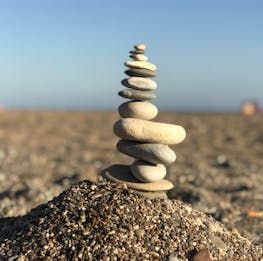Life Lessons Summary
Two Experts on Death and Dying Teach Us About the Mysteries of Life and Living
If you only had a few days left, how would you live differently? The sad reality is that it's often only with hindsight that we understand what truly matters.
Life Lessons urges us not to wait until the end of our lives, to learn lessons that we can learn now. It shares ideas to help us find greater peace and understanding. By providing 14 practical and spiritual lessons, it sets us on the path towards a greater sense of worldly understanding and perception.
Elisabeth Kübler-Ross, a renowned psychiatrist and author of On Death and Dying, passed away in 2004. She had decided to write a final book, but this time on life and living. She felt that the more lessons we learn, the more unfinished business we can put to rest, allowing us to live fully. David Kessler, an author and grief expert, wanted to pass on the lessons he had learned from people at the 'edge of life,' as he terms it. He believes that the dying are the best teachers, as they see life so clearly.
This brief summary will explore what the authors identify as common challenges that we all experience. It contains 14 practical and spiritual lessons. They share experiences of those who've been at the edge of life, and grappled with these issues. They also explain how the privilege of working with such people informed their thinking. The lessons are around authenticity, love, relationships, loss, power, and guilt, and the book also includes insights around time, fear, anger, play, and patience. Finally, it looks at what we can learn about surrender, forgiveness, and happiness.
Life Doesn't End With a Terminal Diagnosis: This is When it Truly Begins
When we acknowledge the reality of approaching death, we recognize the reality of our lives. We realize that we're still alive, and have to live our lives in the now, because there's no "later." People realize that it's one thing to be alive, but quite another to feel truly alive. The dying teach us the importance of living each day to its fullest.
However, to do this, we have to learn many lessons, and some of them are enormously difficult to master. Nonetheless, attempts to understand them can be deeply rewarding. We'll focus on three of these lessons: authenticity, relationships, and fear. We'll explore what Michelangelo's statues teach us about authenticity, and why fear can't prevent death, but can keep us from living fully. And lastly, why relationships are our most significant opportunities to learn, love, and grow.
Looking Behind the Mask
Who are we really, behind our many roles, experiences, and circumstances?
Kübler-Ross says that there's a part of us that doesn't get lost with age, disease, or circumstance. There's an authenticity that we're born with, live with, and die with. Those battling with a life-threatening illness teach us that discovering the true self requires us to let go of what isn't authentically us. We're always the person behind our circumstances.
Kessler gives a personal example that many of us may relate to. While on vacation, he always rushed around, woke up early, and tried to do and see as much as he could during each day. By the time he returned to his hotel room at night, he was utterly exhausted. He realized that his vacations were actually stressful. So he asked himself how he would choose to spend his time if nobody was looking. His answer to himself was that he'd sleep late, see a few sights, and savor these experiences. He'd also spend more time sitting on the hotel veranda, reading a book, or doing nothing. The role of an "enthusiastic vacationer" wasn't one he wanted. Kessler realized he did all of this because he thought that was what he should do. After some reflection, it became clear that he'd be happier if he played by his own rules.
He urges us to learn something about ourselves by asking what we would do if no one else were looking, and to break with habits and try new things. Making these changes may teach us something about a lesson we need to learn. Kessler suggests that, 'If you say you would lie, you probably do not feel safe telling the truth.' It's incredible how much we tend to live according to what we feel we should do, instead of what we actually want to do.
Authenticity helps us to feel more aligned with ourselves and others. Kübler-Ross once received the highly-coveted honor of the "favorite professor" award from her students. When it was announced, her colleagues were nice but said little about it. At the end of that day, a flower arrangement was delivered to her desk. It was from a colleague, with a card that said, 'Jealous as hell, congratulations anyway.' From that moment, Kübler-Ross knew that she could trust this person, and valued him for being so authentic. By showing his true and authentic self, he made her feel safe.
The key is to find our most authentic self and to spot authenticity in others. The great Renaissance artist, Michelangelo, was once asked how he created sculptures such as the Pietà or David. He explained that he imagined the statue as already being inside the rough marble block. As he chipped away at the marble, he revealed what had always been there. Inside all of us is our most authentic self waiting to be revealed.
A terminally ill woman shared a profound insight with Kessler: 'No one else has ever experienced the world in quite the way that I have. And no one else ever will. Since the beginning of time and until the end of time, there will never be another me.' This is true for all of us. Only when we recognize our deepest, most authentic self, can we truly enjoy our uniqueness.
Relationships are the Best Teachers
Through relationships, we learn things about ourselves, as well as how to love and be loved in return. The authors share the following three stories that unpack lessons about relationships.
The first story is about a woman who tragically lost her husband to a heart attack when he was forty-four. She remembered the last evening they spent together. It was uneventful. They ate a simple dinner together and then they watched TV until 9 pm. He said that his stomach was upset, so he took an antacid and went to sleep early. She kissed him goodnight, told him she hoped he would feel better in the morning and that she would join him later. When she went to bed, he was fast asleep. Upon waking the next morning, she realized that her husband had died in his sleep from a heart attack. This heartbreaking experience taught her to never take time or people for granted. There will be "lasts" in all relationships. Looking back, this woman said that she saw her relationship with her husband as a gift she got to keep for a while, but not forever. She now feels this is true for everyone she meets. Knowing this helps her be more present for people and experience each moment as fully as possible. The challenge is for us to look back on events in our lives and feel that we did our best to be fully present.
The second lesson is that it's acceptable for some relationships not to last. We need to look at whether or not a relationship is complete or how best we can complete it. Successful and complete relationships don't necessarily have to last a lifetime. The authors tell the story of James, who felt that every relationship needed to work. When his relationship with Beth ended after two years, even though they both knew that it wasn't right for the long-term, he felt like a failure. He was hurt, angry, and sad. Coincidentally they happened to meet up and started to reminisce. They didn't talk about getting back together. Instead, they spoke about how much they learned from each other. They also admitted that they would be better people in future relationships because of what they had learned from their time together. James could shift his mindset from seeing the relationship as a failure, to one that was complete and successful.
The third lesson is about embracing all forms of love. Hillary was on her fourth hospital admission, having spent a few years undergoing cancer treatments. Her best friend Vanessa, and Vanessa's husband, Jack, were often by her side. Jack found it sad that Hillary hadn't met someone special and was unlikely to find anyone given her circumstances. However, Jack re-evaluated his beliefs about love, when Hillary received a lot of visitors one evening. Watching all of the visitors around Hilary made Jack feel all of the love surrounding her, and he almost felt jealous. He had no idea that so many people loved Hillary, and he had never sensed such genuine love for one person. Later that evening, Hillary also said, 'I can't believe all these people are here to see me. I never knew you all loved me so much.' Hillary's story teaches us that love doesn't need to be in the form of a romantic or "special someone." To love and be loved means learning to love ourselves fully, and being open to all forms of love that come into our lives.
When it comes to romantic relationships, the authors feel that we often demand too much from one another. We might want people to fix us, lift our mood, or bring permanent joy. We're subtly led to believe that we're part of a puzzle, and need someone else to complete us. But often, this fairytale thinking means that we avoid personal responsibility for being happier or finding solutions to our problems. Our wholeness comes from within, and we have to love without illusions. When we let go of old agendas, future scenarios, and ideas of how things should look, love tends to take on a life of its own. It goes where it wants to go, as opposed to where we attempt to direct it. When we manage to let go of our old stories, love might take us to some beautiful places we had not previously imagined for ourselves.
Fears Can't Delay Death, But They Can Prevent Us From Living
Those who are dying, face the ultimate fear. We all live with the possibility of death, but the dying live with death as a probability. Patients at the edge of life share a surprising relief and comfort in realizing that there's nothing left to fear, and nothing to lose. It is fear itself, not the things we fear, that brings so much unhappiness. Fear is a warning system that serves us well. If we're walking late at night in an unsafe part of town, fear warns us to be on guard. We couldn't survive for long without fear's protection. However, we also experience fear when there's no danger. The experience of this emotion is real, but often it has no basis, and if it's not attended to, fear can weaken our spirit. A useful acronym for this kind of fear is: False Evidence Appearing Real. If left unchallenged, fear can wield incredible power, but we can reduce its power if we can move towards what scares us.
Let's look at Troy's story. Troy had been suffering from an autoimmune deficiency disorder for three years. He was coping physically, but fear, although not paralyzing, kept him at a distance from life. His partner kept telling him that he was stronger than his fears, and he would ask Troy to face them. He advised, 'Take your worst fear to lunch, and you'll find it doesn't have the power over you that you think it does.' Troy wasn't working at the time, and was approached to be a caregiver for a woman.
Jackie was terminally ill, was wheelchair-bound after a stroke, and had difficulties with speech. When Troy looked into her eyes, he felt that he could see her fear of death and being alone. Troy knew these fears well because they were his own. Despite feeling underqualified and afraid of the task ahead, he accepted the job. He knew he needed to step forward, confront his own fears, and help this stranger. Troy worked full time for Jackie and became her closest friend. On the day she passed, Troy held her hand, felt the intensity of her fear, and could calm her, telling her to step towards the fear. Troy fought fear with love and compassion. He believed that fear isn't built on a strong foundation, and subsides just by moving towards it. The lesson here is that If we live in fear, we're not living a full life. Furthermore, once we're on the other side of our fears, we might find a new life awaiting us.
In Conclusion
When we explore these lessons from the edge of life, we find it easier to accept that our lives will end. But we also become more aware of the life that's happening now. There's a saying that whenever a baby is born, it means that God has decided that the world will continue. In the same way, every day we wake up, we're given another day of life to experience. So we need to ask ourselves when last we fully experienced a particular day. The authors recall how they were always reminded of this when they heard the dying say that they just wanted to see the stars one more time or gaze out once more at the ocean.
The authors sum up the life lessons by saying, 'You don't get another life like this one. You will never again play this role and experience this life as it's been given to you. Don't wait for one last look at the ocean, the sky, the stars, or a loved one. Go look now.'




